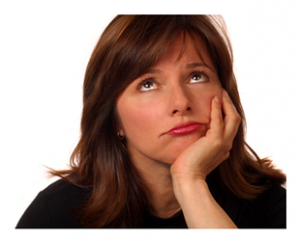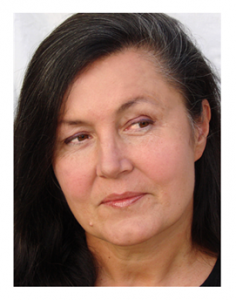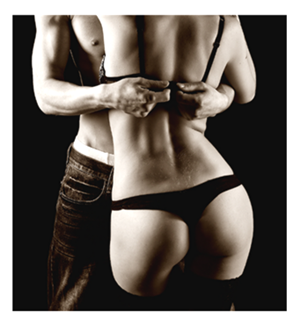It’s only fair, right? Isn’t it time to examine my own side of the gender gap?
So what makes a woman tick?
 Weird science
Weird science
Now why is it that when I set myself the task of elaborating on what makes a woman a woman, the first word that popped into my mind was biology. And the second? Chemistry.
Why is it that the phrase “nature versus nurture” popped into my mind next?
Aren’t the facts of our anatomical, biological, chemical (and yes, psychological) selves – our physical selves – as valid for men as for women? And yet while musing on men, I went straight to behavioral differences, to communication issues, to social conundrums in relationship, rather than recognizing what only one reader had the… dare I say it… balls to state.
We are defined, at least in part, by biology.
When I gave birth to sons I immediately realized how different they were from the little girls my friends were raising. All my preconceived notions of nurture outweighing nature went right out the window with… the bath water! Did I suddenly embrace the concept that nurture was irrelevant?
No indeed, but nature is not to be denied.
Women and cycles
When I think of my own womanliness, it is inseparable from a life of monthly cycles, a life determined in some way by childbearing – working to prevent it, then longing for it, then cherishing it, then mourning its passing. And what woman doesn’t recognize her moods and mannerisms that she owes to nature first – and nurture or learned behavior second?
What makes this woman tick?
When I am honest – biology, and chemistry. And then – a passion for language, for learning, for art, for travel, for questioning, for discovery; a profound pleasure in what is carnal and sensual; a ferocity when it comes to protecting my children that seems like, well… the most natural thing in the world.
And maybe it is. Natural, as in nature – not nurture.
My body, myself
 Does anyone else remember the groundbreaking “Our Bodies Ourselves” when it first appeared? Best I recall that was the 70s, and at the time, it was remarkable to read the text, see the pictures, learn about our own bodies in ways that our mothers did not discuss and that we, ourselves, were ignorant of.
Does anyone else remember the groundbreaking “Our Bodies Ourselves” when it first appeared? Best I recall that was the 70s, and at the time, it was remarkable to read the text, see the pictures, learn about our own bodies in ways that our mothers did not discuss and that we, ourselves, were ignorant of.
35 years later, I still define my femininity at least in part by my physical attributes – those I pride myself on, and those which are beginning to fade a bit, as I age. I love the silkiness of my hair, the softness of my womanly body, the way I react – naturally – when an attractive man touches my hand or looks at me in a certain way.
I also define myself by my mothering, and find it sad and ironic that the traces of childbirth on my body are disparaged by both men and women in our culture.
Boundaries
In my woman’s body, in my diminutive stature, in my genetic contours that run in the family, I always knew I would never be a basketball player – which does not mean that women cannot and are not basketball players.
Had I been tall and lean and swift and loved to shoot hoops, we might have a different story.
We are all constrained by the realities of our physical selves – biology, chemistry, genetics. And I know myself to be bounded by biology in the way that all women are – the drive to bear children that is stronger for some of us than others. The biological clock. And there is nothing quite like pregnancy to teach us how fragile we are – and how powerful.
Yet my truest boundaries as a woman remain cultural and societal, even as I maneuver around some and scale others. Even as they go hand in hand with my physical realities. And isn’t that the same for both men and women?
Relationships, cultural factors
I ask myself what makes a man tick for two reasons: to better understand my sons, and more so – as I visualize relationship possibilities. What makes me tick – or any woman – will be general and specific, simple and complex.
As for men, women, and sexuality – I will not grant the blanket statement that men are more sexual than women (not my experience). I will say they are sexual differently. And isn’t that also nature + nurture? I will not grant that men feel things less profoundly then women; I believe they are socialized to express less, and be quicker to anger. Isn’t this also part of our physical make-up?
 Being quicker to anger remains a personal trait; I have known men who are slow to express anger, and women who flare up with little instigation. Again – nature, nurture, and whatever pushes our buttons come into play.
Being quicker to anger remains a personal trait; I have known men who are slow to express anger, and women who flare up with little instigation. Again – nature, nurture, and whatever pushes our buttons come into play.
Our “whole” selves?
What makes a woman tick?
The answers are as varied as there are women, and yet aren’t we all bound to our rhythms and to whatever and whomever attracts us? Is that nature, nurture, a bit of both?
Even in the light (and shadow) of yesterday’s insightful exploration of masculinity and femininity, wouldn’t the woman taking the spotlight be equally diverse? Both imposing and inviting? Madonna? Whore? Angel? Avenging angel?
I am my biology. I am my chemistry. That often translates into mood and personality. It certainly transforms into desire to love, and sexuality.
I am my learned behaviors, my preferences, my skills and talents which have nothing to do with gender. Yet I recognize that my ability and freedom to express emotions and affection rise out of both biology and social acceptance.
I am the roles I have tried on and not shed, the trappings I have chosen to retain, the troupe of players in all of us to which Bruce alludes in his essay. I am my vision, my voice, my empathy, my dreaming, my tenderness, my capacity, my endurance, my curiosity, my strength. I am my values, my sense of honor, my need for clarity, my comfort with mystery. And more. As are we all.
What makes you tick? How much “you” feels gender-defined?
You May Also Enjoy
Interesting stuff. As I think about my own biology and identity what strikes me most is that I’m acutely aware of each, but in my mind they are not intertwined. I think about my body, my fertility, and when we will have another child a great deal. And I think about my identity – interests, passions, and curiosities – a great deal too. But I don’t think about the interplay between them. I have no idea why that is, but I’m going to explore it. Thanks for the thought-provoking post.
Well, of course the reason we differ is because we’re from Venus and they’re from Mars. Gosh, easy peasy.
Going from being inane to being a bit more serious, I suspect that biology has a great deal to do with it, but I also think society has a very large part, which you’ve already said. We become, to an extent, that which we are expected to be. That we choose to be. I don’t change tires because I choose not to; because I choose to consider that a “man’s job”. Like taking out the garbage.
@Carol – Ah yes, the interplanetary interpretation. 🙂 I prefer to think of us as adjoining countries with territories that overlap and may occasionally cause a little contention in terms of “ownership.” I’d like to think that given basic differences that reside on the physiological plane, we nonetheless are capable of honoring those differences and then “negotiating” some of the others. Societal conventions make that difficult. Still. Especially when you add the hard work of children to the mix – if we’re being honest.
Interesting and maybe I’m weird, but I don’t really think of myself as a woman. I mean, sure I am a woman, but when I think of “woman” and all that the word encompasses, it doesn’t seem to fit me. I am simply a person – yes, a woman; yes, a mother. But I am also a golfer and a skier, a pool player and beer drinker. I get along best with men, or other women similar to myself – other women that just are.
@Cathy – I find your response fascinating. It’s actually a response I might use for myself (or friends) relative to ethnicity or religion, but not gender. My femaleness is so much a part of my identity that I only realize in reading your comment that I cannot possibly separate it out from all the other elements of who I am – parent, writer, worker, lover, neighbor, friend, member of various communities. Did you grow up in a large family? With brothers? Here is an example of where I think “nurture” may indeed affect aspects of identity. So your response is a bit of a revelation to me. Thank you for that.
I read a book in college that I’ve held onto (literally and figuratively), When Biology Becomes Destiny, about women in Hitler’s Germany and the roles they were expected to play. It has always reminded me, on a much less severe scale, of course, about the roles society expects me to play, the ones I expect myself to play, and the interchange between who I think I am and who my biology dictates that I am … all very deep, interesting stuff that is so easy to ignore or push away in the day-to-day throes of dish- and laundry-doing and butt- and nose-wiping.
While Venus and Mars exert their influence to be sure, I feel like the sun and the moon hold different sorts of sway; the tide-governing moon, waxing and waning, relates to the feminine (which, of course, pulses latently in men just as the masculine does in women), to non-linear, non-causal, mystical aspects of life. Meanwhile, the sun, even though it too ebbs from solstice to equinox, is also more of a dark-light separator (a clock maker as much as a calendar maker) from which causal, logical, enlightenment sort of thinking derives.
It is these opposites that also attract (and at the same time quarrel)—the material (which is truly feminine in Chinese thought, or at least Yin) and the spiritual (which is more Yang/masculine). The irony of modern life, along with its alienation, seems to be that men have become materialists and it is women who hunger for soul, spirit and higher love (yet when women want to nest, the man sometimes feels trapped and burdened… perhaps some men “nest” in their sports cars?).
We are all sensual animal beings and illuminated spirit beings, we are also truly social (i.e. interconnected) beings.
Whether opposites attract or dust it up, in the end it is the confluence of opposites that make more than the whole—it makes the magic.
Either way, here’s to women, and to loving them in all their multiplicity.
I’m picturing men attempting to nest in their Ferrari’s, Bruce… A little string, a few twigs, and a car seat strapped… somewhere, strewn with crumbs from crackers and splattered with spills from sippy-cups. Somehow, I’m thinking that’s a not. 😉 But there are strange ironies in our confused gender territories. Some seem to entertain us, and other baffle us. But I’m all for the magic in whatever mix-mastery we can conjure.
Man Vs Woman is like sun against moon . Both have there unique qualities which cannot be underestimated by the other. Like you said the first point of difference which occurs to me while thinking about the differences between men and women is but obviously the biology .
Woman’s World – Do you know about your status in this world?
http://www.3smartcubes.com/pages/tests/womansworld/womansworld_instructions.asp
Wow. So much here to contemplate. I’ve read your post 3 times and still don’t know where to begin. While I don’t necessarily feel “gender-defined” as a method of validation or invalidation, I agree that gender does play a part in how most women (and men) view the world and respond to it. Stereotypes aside, there is no question we are wired differently. Neither is better…jut different. Our worldview and how we responds to our circumstances is what makes us “tick.”
Does my femininity/womanhood/female-ness of being a “woman of a certain age” define me? To a certain extent, yes. But, not at the expense of self-esteem or the expectations I still have of myself.
Wonderfully compelling. I enjoyed it very much.
I did not grow up in a large family and only have one sister. I grew up in a very rural area (farm actually) with no sophistication at all. We had three snowy TV stations until my parents got cable when I went off to college. My mother didn’t wear makeup and trips to the salon were in all sense simply practical. I think the only thing that made me feel womanly were my pregnancies and, of course, mothering my children. I told you, I’m weird.